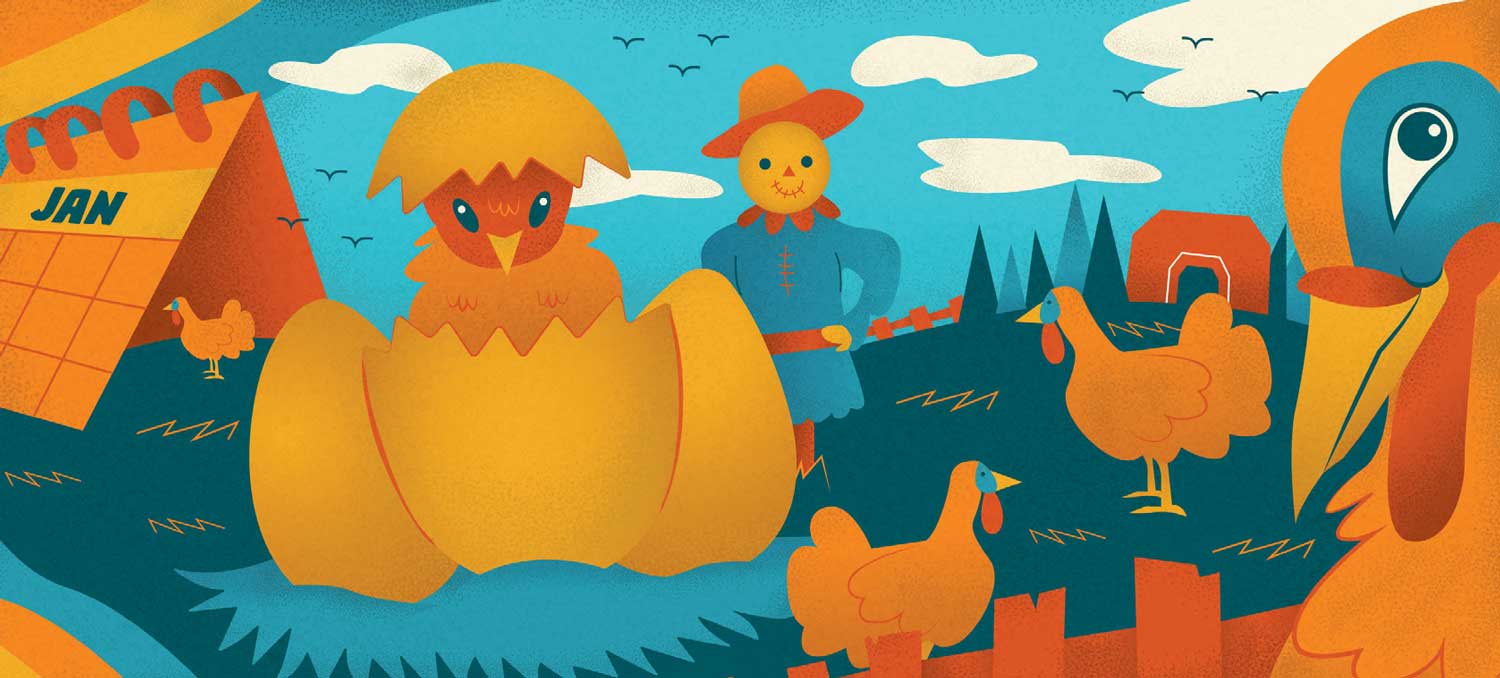160 Turkeys
What it takes to raise and sell local birds
On my fortieth birthday, the first text message I responded to was about Thanksgiving turkeys. Chris Kyger of C&C Farms in Drumright, OK had some time-sensitive questions: Did I want the turkeys frozen or fresh? Should they arrive late on the 14th or early on the 15th? My birthday is in August.
These turkeys had, at least in a theoretical sense, been in my life since January when I reserved them for the grocery store I co-own, Urban Agrarian.
Every year I marvel at what it takes to raise, transport, market, and distribute just 160 pasture-raised, local birds. And I would like you to marvel with me.
For most Americans, turkeys are the largest and most expensive piece of meat they buy in the course of a year. And this meat will have an audience. First, you have to find the right bird, then you have to decide whether to wet brine, dry brine, deep fry, spatchcock, or some combination therein.
I don’t make light of your trials when I say that you are on the easy-street, receiving-end of what is frankly, an ordeal. I, meanwhile, am squarely in the middle. My farmer friend is at the long front-end, along with the turkeys themselves, whom I have great sympathy for since it is an understatement to say they get the worst end of this deal.
First, let’s discuss the scale of this. Americans consume roughly 46 million turkeys at Thanksgiving, according to the American Turkey Federation. Meanwhile, I propose to sell just 160 birds. The fact that this is a tremendous amount of labor while also representing just a drop in the turkey ocean is demoralizing, so I try not to dwell.
Here’s where it starts: in January, after I tell Chris how many turkeys I want, he calls a hatchery in West Virginia to reserve his chicks. Hatcheries are integral to commercial poultry farming because the infrastructure to care for a brood of eggs en masse is highly specialized and completely different from the infrastructure required to actually raise the birds. This year, Chris got to peek into a hatchery transport truck, designed to drive cross-country with turkey chicks. It was pristine, state-of-the-art, and cost a whopping $400,000.
So Chris orders chicks, and in mid-July, dozens of two-day-old puffballs arrive in the mail. They need immediate food and water. For a few weeks, Chris and his family take turns checking on them at all hours of the day and night to make sure they are warm and fed and to guard against another risk: suffocation. If the turkeys see something curious, they tend to climb on top of each other to get a better look, with disastrous results.
Chris raises Nicholas turkeys, a widely used commercial variety. Nine years ago, when Chris first started raising turkeys, he took a different path. Inspired by Joel Salatin, he bought heritage breed birds and put them out to pasture. Heritage breeds are older domestic breeds, developed in a time before mass-commercial farming prioritized uniformity and lighting-fast growth. But they were so free-range that a week before their harvest date, all fifteen birds flew away.
The next year, Chris successfully took twelve pasture-raised heritage birds to the processor. But none of his customers liked them–they were a little wiry, with small breasts.
The Nicholas turkeys are essentially a flightless bird, a fact that has always bothered me about commercial turkey breeds, although it is obviously impossible to know if it bothers the turkeys. These days, Chris hardly ever loses a bird; from the moment they arrive as puffballs to the day they leave the pasture and follow him congenially into a trailer for their second and final big trip, Chris is in command. Not only are the turkeys born out-of-state, they have to be processed out-of-state because, until this year, Oklahoma has been completely devoid of poultry processors that serve small farms. This situation puts a huge burden on farmers and added stress on the animals.
The length of that final journey means that Chris stays overnight in Kansas (an added expense) before finally delivering the freshly butchered birds to Urban Agrarian the next day. Then, they become our problem.
We're talking about roughly 3,000 pounds of problem. The answer to Chris’s question way back in August was irrelevant. Whether the turkeys arrive fresh or frozen, we have to freeze them immediately for food safety because Thanksgiving is still more than a week away. That means we move 3,000 pounds of poultry by hand into freezers not designed for that capacity because it’s a volume we handle only a few days every year.
The logistics always make me sweat. Most of the birds have been reserved, with pre-paid deposits, and customers have requested specific sizes in advance. We have two small stores, one in Downtown Edmond and one in the Oklahoma City Farmers Market District, so we have to rotate correctly sized turkeys into each store on the right days according to when each customer wants to pick them up. Inevitably, there are special requests: “Please thaw my bird beginning on Sunday” and “Please, can I have the biggest turkey you receive and the smallest?”
Approximately eight days before Thanksgiving, I make my perennial statement of defeat: “This is all too hard. People should just eat Doritos.” Doritos being, in my mind, the antithesis of everything I’ve spent my life doing: creating space in communities for small farms to thrive and fostering connections between people through local food.
But here’s the thing: it is an honor to sell someone their Thanksgiving turkey. I say that without irony or platitude. It is like a small piece of me goes out into the world and sits down to eat with 160 families.
And when I’m really lucky, I get to work the store on the Saturday before Thanksgiving, and someone will say, “This is my first time cooking a turkey, what should I do?” Then we talk about all the things, spatchcocking and brining and cook times. And I don’t say, “This will be hard. This has already been hard.” I say, “You’ll be fine. This is a beautiful bird. Salt helps.”
Urban Agrarian, 1 E. Main St. in Edmond and 1235 SW. 2nd St. in Oklahoma City, urbanagrarian.com, (405) 231-1919.






